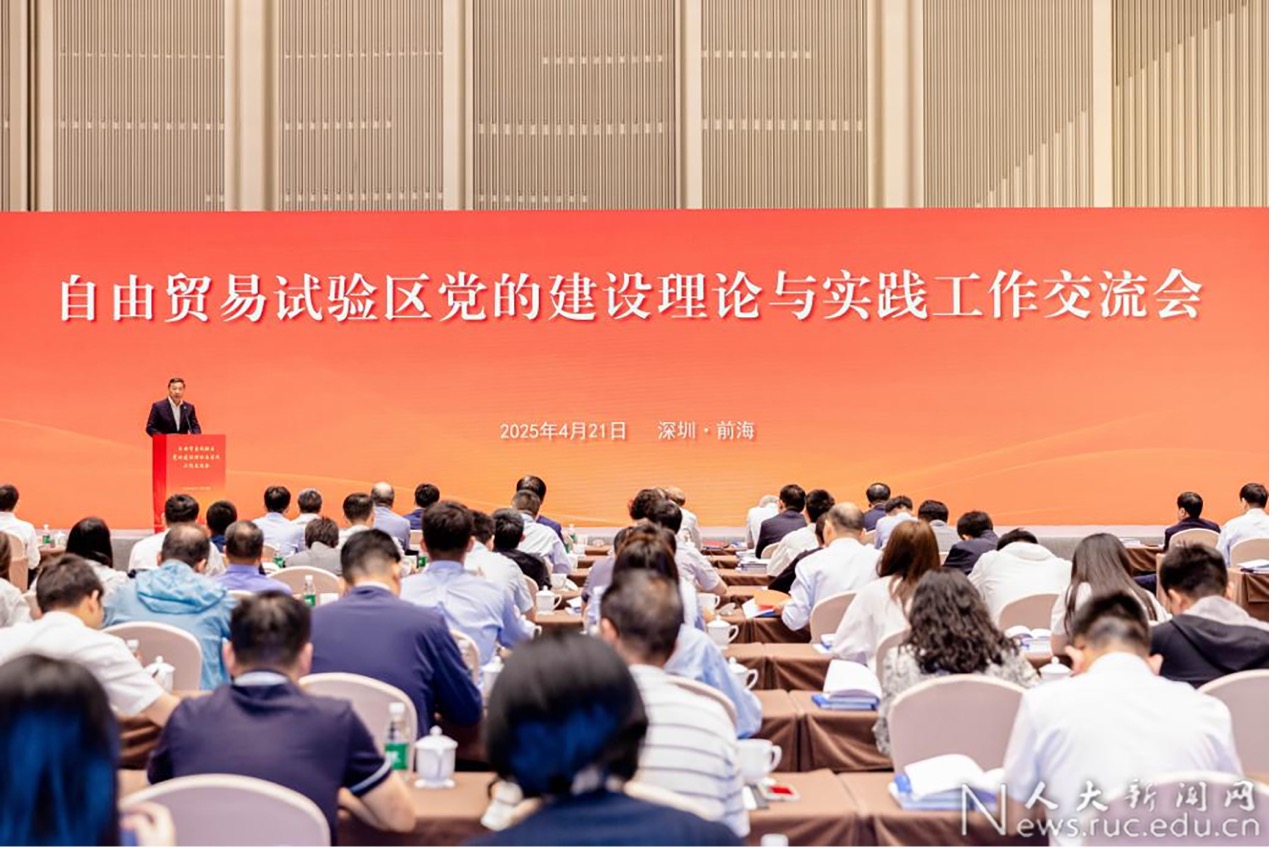On April 21, the Symposium on the Theory and Practice of Party Building in Pilot Free Trade Zones was held at the Qianhai International Conference Center in Shenzhen.

Fu Xingguo, Vice President of the National Party Building Research Association, and Zhang Donggang, Chair of the University Council, attended the symposium and delivered keynote speeches. Other attendees included Pu Shiyu, Vice President of the Xinjiang Party Building Research Association; Cheng Buyi, Member of the Standing Committee of the CPC Shenzhen Municipal Committee and Head of the Organization Department; Wang Shourui, Member of the Standing Committee of the CPC Shenzhen Municipal Committee, Secretary of the Party Leadership Group and Director of the Qianhai-Shekou Free Trade Zone Authority, and Secretary of the CPC Working Committee of the Qianhai Cooperation Zone; and Qinggeletu, Deputy Secretary of the Party Committee of RUC.
In his keynote speech titled “Providing Strong Support for the Frontline Practice of Chinese Modernization through High-Quality Party Building”, Zhang Donggang emphasized that the establishment of pilot free trade zones is a major strategic initiative by the CPC Central Committee, to deepen reform and opening-up in the new era. He noted that this initiative marks a milestone in China’s reform journey. Hosting this symposium is a concrete step in implementing important thoughts on Party building and his strategic guidelines for the development of free trade zones. It aims to strengthen Party leadership in ensuring the FTZs move in the right direction and serves as a key exploration in the modernization of China’s governance system and capacity.
Zhang underscored the significant role and promising prospects of FTZs and stressed the necessity of upholding the CPC’s overall leadership. He proposed four key pathways to ensuring high-quality Party building that supports high-quality development:
Consolidating the ideological foundation: Closely integrate theoretical research and practical exploration of Party building with the realities of FTZ development. Strengthen Party leadership and drive theoretical innovation.
Reinforcing organizational capacity: Leverage the unique advantages of FTZs as frontier zones of reform and opening-up. Focus on nurturing talent in strategic emerging industries, future industries, and frontier technologies to enhance competencies.
Improving institutional frameworks: Establish and refine Party building mechanisms and management systems tailored to the developmental needs of FTZs to enhance governance efficiency.
Stimulating internal dynamism: Based on the strategic positioning of FTZs at the intersection of domestic and international circulation, build networks that span regions, domains, and levels to promote coordinated cooperation and drive innovation.
Looking ahead, Zhang expressed his commitment to strengthening collaboration with various sectors, building confidence through Party building, promoting pragmatic actions, and rallying collective strength to fully unleash the power of high-quality Party building in advancing high-quality development. He emphasized the goal of contributing to the construction of FTZs and, more broadly, to the comprehensive modernization and rejuvenation of the Chinese nation.
At the symposium, a selection of best practices in Party building within high-level platforms for opening-up was released, along with the first batch of self-selected research topics on FTZ Party building. A special team of invited researchers for FTZ Party building was also established. Representatives from the Chinese Academy of International Trade and Economic Cooperation under the Ministry of Commerce, the Organization Department of the CPC Shanghai Municipal Committee, and the CPC Working Committee of the Qianhai Cooperation Zone shared their experiences and insights on related topics.
In-depth discussions were held by representatives of FTZs and academic experts around the theme of “Driving High-Quality Economic Development through Innovative and Open FTZ Party Building.” Qin Xuan, Dean of the Academy of Xi Jinping Thought on Socialism with Chinese Characteristics for a New Era at RUC, participated as a guest commentator during the panel session titled “Innovating Party Building Mechanisms and Organizational Coverage in Emerging Fields within FTZs.”
Other attendees included Zhao Shumei, Executive Deputy President of the Party School at RUC, and Song Ke, Executive Vice President of the Shenzhen Research Institute and Executive Dean of the Institute for Advanced Studies in Social Sciences (Shenzhen).


